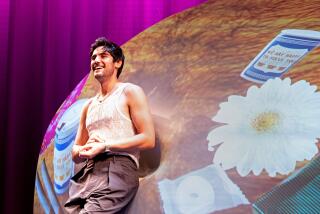In the Morrison Family, the Daughter Also Rises
- Share via
About a year ago, Van Morrison told an aspiring singer-songwriter he liked her band’s first do-it-yourself CD, noting that two songs in particular were “really good.”
Having gotten this rare blessing from the austere, enigmatic and much-beloved eminence of soulful rock music, the up-and-comer:
A. Summoned all her friends to celebrate with champagne until dawn.
B. Chose the solitary exultation befitting an artiste and started scribbling in her diary.
C. Kind of forgot some key details of the incident.
The answer, C, becomes slightly comprehensible when you realize that, for Shana Morrison, he’s not Van the Man, but her old man.
“He thought my voice was getting better and he liked the songs,” she recalled of her father. “He mentioned two--’Those two are really good.’ ”
Which ones were they?
“I can’t remember. It was about a year ago.”
Maybe the famously introverted Van was mumbling, as he sometimes does on stage. Or maybe it’s a comment on the inherent imperfections of parent-child communication. But fans of bluesy, adult-alternative style pop and rock are apt to find a favorite or two of their own on “Caledonia,” the album Shana Morrison, 28, and her band will bring as a calling card to their Orange County debut Sunday afternoon at Muldoon’s pub in Newport Beach.
Writing and performing with four seasoned players from the Marin County music scene, the younger Morrison arrives with a catchy, varied and crisply performed CD that builds on the promise developed over the past five years in her first professional gig: singing backups and duets in her father’s band.
The album flits between melancholy, liquor-stoked lust, romantic longing and airy moments of fun--showing a command of blues, country and soul on songs that summon up the likes of the Wallflowers, Natalie Merchant, Sheryl Crow and Bonnie Raitt.
Where some have allowed themselves to be overshadowed by the influence they’ve drawn from Van Morrison’s indelibly idiosyncratic singing style (exhibit A being the early Bruce Springsteen), his daughter confidently proceeds in her own voice, even while covering dad’s glowing “Sweet Thing.”
Shana (rhymes with Donna) grew up surrounded with musical influences. Her mother, Janet, is a singer and songwriter who hails from a musical family (Van dubbed her Janet Planet during their marriage, in which she was the romantic muse for his most widely cherished albums, including “Astral Weeks,” “Moondance” and “Tupelo Honey”). They split while Shana was still a toddler; she has no memory of them together and spent her girlhood shuttling between their separate Marin County homes.
Music and Books Filled Weekends at Father’s
Shana said weekends and holidays with her father revolved around music and books.
“Band members would come over, people would want to go over ideas. My dad’s a huge record enthusiast, so there was tons of record playing, and he would buy me records.”
Van didn’t try to impose his taste, she said, but added he has almost no tolerance for music he doesn’t like. “Sometimes you put on something and he runs to the stereo as fast as he can to turn it off because he can’t stand it.”
Shana said he has toned down his response--somewhat--for certain less keenly received recordings of her own.
“He’s heard all the demos I’ve done. Some of ‘em, you can tell his brow is a little furrowed and he storms out of the room [after the tape ends],” she said lightly. “It’s a massive three minutes he’s had to listen to the record.”
Also important were her grandparents, George and Violet Morrison, who moved from Belfast to Marin County when Shana was 2, and stayed for the next 10 years.
“My grandmother taught me the first songs I ever learned--’Star of the County Down,’ ‘Danny Boy,’ ‘Tell My Ma’ [and other Irish folk standards]. She would hold me on her knee and the whole afternoon just sing song after song.”
Shana said that at 77, Violet, to whom “Caledonia” is dedicated, “is one of my best friends in the world” and still capable, when visiting from Belfast, of getting up with her band to belt out a good blues.
George Morrison, Shana said, was a withdrawn man who seldom spoke but loved collecting jazz and blues records; her grandparents ran Caledonia Records, a shop in Fairfax. Shana, whose middle name is also Caledonia--the mythic name of Scotland, as well as a near-ringer for “Caldonia,” the Louis Jordan jump-blues standard--worked at the record store as a girl, paid in vinyl.
“When a customer came in, [George Morrison] would just run in the back,” Shana recalled. “My grandmother worked at the cash register. She could entertain people for hours; she was a great conversationalist.”
That easy affability must have rubbed off on Violet Morrison’s granddaughter, a ready, bright talker in a recent interview from her Mill Valley home--unlike Violet’s son, who is notorious as one of the most elusive, uncomfortable and sometimes hostile interview subjects in all of rock.
“I think he’s a very introverted person,” Shana said of her father. “My grandfather [who died in 1988] is the extreme; my dad is not even comparable to him. Maybe it’s hard for him to open up to complete strangers; I don’t know exactly what it is. It’s definitely not just when it’s time for an interview. He’s just a very inward, thought-driven person.”
As Shana reached her teens, Van Morrison moved to London, his parents returned to Northern Ireland and she joined her mother in Los Angeles. “Gladys,” the most poignant song on her album, begins with a memory of the parting: “Gladys hides her sadness/In a small cigar box her daddy left behind so long ago.”
“I actually do have a cigar box of my dad’s that was left when he moved out of his house in Sausalito. . . . It’s where I keep my keepsakes and stuff.”
Singing in Musicals, Choir Laid Foundation
Shana sang in high school musicals and in college choir while attending Cal State Northridge. Her mother, who was pitching songs to Top 40 artists in the 1980s, commandeered her as a demo singer. Shana learned vocal and stylistic dexterity trying to make her mother’s efforts sound like the latest hits. But that close-up glimpse of the struggle and uncertainty of the music business made her shy away from a performing career.
“My mom would drive me crazy, writing songs and doing demos. I would be like, ‘God, what a life. She never leaves the house and never gets a paycheck.’ She had her studio in the house and wound up never leaving.”
Shana decided that finance and law would be better. Her father, a veritable geyser of malice toward the music business, was blunt when informed of the prospect of his daughter in pinstripes: “He said, ‘Why do you want to do business? Business people are [expletive].’ ”
Van Morrison arrived on the Pepperdine University campus for Shana’s graduation in December 1993, a knight in artistic armor--or so we can only speculate, since our request for a few moments on the telephone with him was predictably futile--bent on the chivalry of saving his beloved damsel from the dungeons of industry.
“We had that fatherly-daughterly conversation. Did she have a job lined up? No? Then how about joining his band? It was completely out of the blue,” she said--and welcome.
“I was so burned out from sitting in front of a computer. I wanted to do something creative.”
She thinks her father may have been encouraged by the heightened interest she showed for his music during 1993--a result, she said, of his hiring Brian Kennedy, a Belfast-raised singer she befriended and recommended to her dad while spending a college year in London.
Her father can be a stern musical master, but she had special status.
“He’s very demanding, very critical. There’s a tension about it, and people know you [have to] be consistent and also . . . able to be experimental . . . otherwise, you’re gone. I didn’t really feel that pressure . . . I felt he was being more supportive to me because he wanted to encourage me and not scare me away.”
After a year working steadily with her father--she has sung periodically with him since--Shana moved back to Marin County, got a day job as a paralegal and began singing in Claddagh, a Bay Area institution that plays rocked-up traditional Irish music.
She eventually formed her own band, Caledonia (what else?) with fellow Claddagh alumni. They built a solid club following in Northern California, and Shana’s appearances on Van Morrison’s records and shows helped them progress quickly. Shana, who manages the band, said several record offers came in; she was about to sign last year with a subsidiary of MCA that Dolly Parton was launching, but a corporate shake-up brought on by Seagrams’ purchase of MCA derailed the deal.
Track From CD a Hit in Europe
“Caledonia,” a collection of demos, came out independently last St. Patrick’s Day and will be relaunched with national and international distribution next month.
Morrison and her band played their first Los Angeles showcase two months ago in hopes of attracting label interest. She has joined producer Narada Michael Walden for songwriting sessions in Hawaii and traveled periodically to Nashville to hook up with writing partners.
Her first big musical validation came last year when “I Spy,” the lightly funky, instantly memorable leadoff track on “Caledonia,” was recorded bilingually by a French singer and became a hit in Europe.
“Labels have told me it’s a hit song, and it turns out it is,” she said proudly. “I’m excited about it. I think if we do make a CD under a major label, we’ll re-record that song properly, not in [a] bedroom.”
Morrison said her band already does well enough with its gigs to sustain itself indefinitely.
“I would like to have a career singing. I enjoy doing it, I like the entertainment . . . and the creative aspect of it.”
Last month, Shana sat in with her father as he played a series of shows in San Francisco.
“I told my dad, ‘Nobody’s singing soprano [backups]. I could do that.’ He said, ‘You’re not a backup singer.’ I only sing duets now. I guess I’ve been promoted.”
In the family tradition, it seems that Shana Morrison has reached the point where it’s too late to stop now.
* Shana Morrison and Caledonia play Sunday at Muldoon’s, 202 Newport Center Drive, Newport Beach. 2 p.m. Free. (949) 640-4110.
More to Read
The biggest entertainment stories
Get our big stories about Hollywood, film, television, music, arts, culture and more right in your inbox as soon as they publish.
You may occasionally receive promotional content from the Los Angeles Times.










